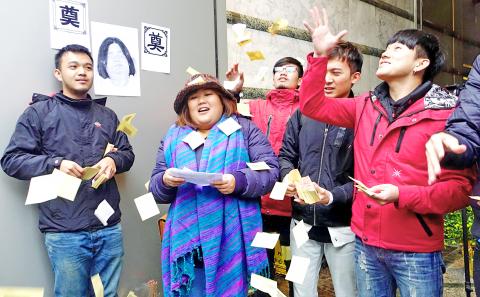Controversy over the portrayal of Aborigines in the film David Loman 2 (大尾鱸鰻2) continued yesterday, with activists protesting outside the offices of movie producer Vision Film Workshop Ltd.
Members of the Indigenous Youth Front held incense sticks while bowing before a picture of film director Chiu Li-kwan (邱?寬) in a mock memorial service, fumbling as they peeled through sheets of joss paper before flinging them in the air.
Activists said their inappropriate use of the “Han Chinese” ceremony was meant to spotlight the misrepresentation of their culture in David Loman 2.

Photo: Chen Yi-chuan, Taipei Times
The film has been criticized for a scene in which the main characters run into Tao Aborigines protesting against nuclear waste being stored on their native Orchid Island (Lanyu, 蘭嶼), with one character speaking gibberish to the protesters, who call him a “lunatic.”
“When you take something you are not familiar with and put it in the film as a joke, your racism is rubbing salt deep into 30-year-old wounds,” said Indigenous Youth Front member Savungaz Valincinan, a Bunun Aborigine.
She said Tao Aborigines had been deceived about the purpose of the nuclear waste site, which she said was built in the 1980s without any public hearings or consultation.
“The impact of movies goes far beyond what most people think,” she said, citing as an example the 1980s film Yes, Sir! 2 (報告班長2), which has had a lasting impact in spreading stereotypes about Aboriginal accents, with variety show hosts still using long drawn-out syllables at the end of sentences to tease Aboriginal guests.
“In the future when people see Tao Aborigines wearing their sacred hats and armor made of vines, will they think it’s funny?” she asked.
She demanded that the film producer issue a “sincere apology” and remove the controversial scene when the movie is released on video.
“Regardless of whether or not racism is ‘intentional,’ it still creates a huge amount of damage,” she said, calling for education reforms to bring in Aborgines’ perspectives and for the removal of nuclear waste from the island.

Taiwan is stepping up plans to create self-sufficient supply chains for combat drones and increase foreign orders from the US to counter China’s numerical superiority, a defense official said on Saturday. Commenting on condition of anonymity, the official said the nation’s armed forces are in agreement with US Admiral Samuel Paparo’s assessment that Taiwan’s military must be prepared to turn the nation’s waters into a “hellscape” for the Chinese People’s Liberation Army (PLA). Paparo, the commander of the US Indo-Pacific Command, reiterated the concept during a Congressional hearing in Washington on Wednesday. He first coined the term in a security conference last

Prosecutors today declined to say who was questioned regarding alleged forgery on petitions to recall Democratic Progressive Party (DPP) legislators, after Chinese-language media earlier reported that members of the Chinese Nationalist Party (KMT) Youth League were brought in for questioning. The Ministry of Justice Investigation Bureau confirmed that two people had been questioned, but did not disclose any further information about the ongoing investigation. KMT Youth League members Lee Hsiao-liang (李孝亮) and Liu Szu-yin (劉思吟) — who are leading the effort to recall DPP caucus chief executive Rosalia Wu (吳思瑤) and Legislator Wu Pei-yi (吳沛憶) — both posted on Facebook saying: “I

The Ministry of Economic Affairs has fined Taobao NT$1.2 million (US$36,912) for advertisements that exceed its approved business scope, requiring the Chinese e-commerce platform to make corrections in the first half of this year or its license may be revoked. Lawmakers have called for stricter enforcement of Chinese e-commerce platforms and measures to prevent China from laundering its goods through Taiwan in response to US President Donald Trump’s heavy tariffs on China. The Legislative Yuan’s Finance Committee met today to discuss policies to prevent China from dumping goods in Taiwan, inviting government agencies to report. Democratic Progressive Party Legislator Kuo Kuo-wen (郭國文) said

The Ministry of Economic Affairs has fined Taobao NT$1.2 million (US$36,900) for advertisements that exceeded its approved business scope and ordered the Chinese e-commerce platform to make corrections in the first half of this year or its license would be revoked. Lawmakers have called for stricter supervision of Chinese e-commerce platforms and more stringent measures to prevent China from laundering its goods through Taiwan as US President Donald Trump’s administration cracks down on origin laundering. The legislature’s Finance Committee yesterday met to discuss policies to prevent China from dumping goods in Taiwan, inviting government agencies to report on the matter. Democratic Progressive Party